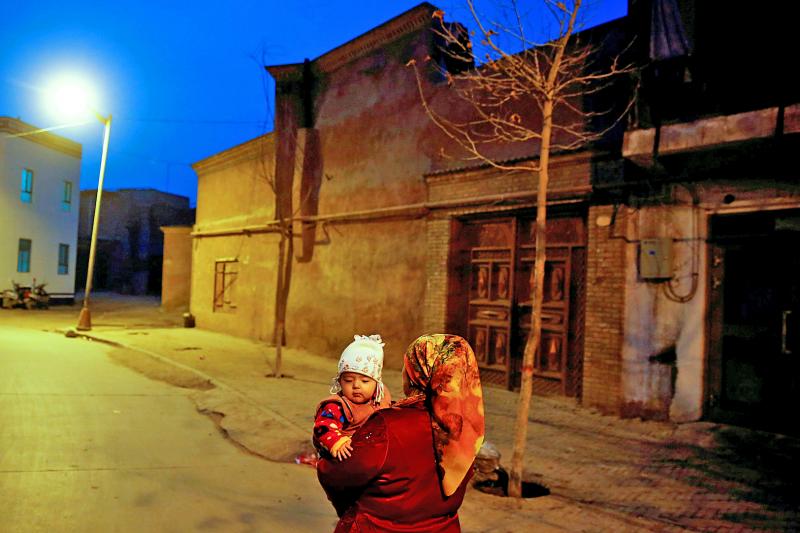Chinese policies aimed specifically at reducing the population of mainly Muslim Uighurs in Xinjiang could prevent the birth of about 4 million babies over the next two decades, new research has found.
Projections show reduced minority birthrates could raise the proportion of Han Chinese from 8.4 percent to 25 percent in southern Xinjiang.
Beijing has for years sought to tighten its grip on the vast border area historically marked by economic inequality and sporadic outbreaks of unrest.

Photo: Reuters
Millions of Han Chinese have relocated to Xinjiang to find work in the coal and gas-rich region in a settlement drive that has caused friction.
German researcher Adrian Zenz said publicly available papers by Chinese security researchers blamed the density of minority communities as the “underlying reason” for unrest and proposed population control as a risk-reduction method.
At the same time, documented official fears about the arid region’s lack of natural resources to support an influx of Han Chinese settlers suggest that the authorities see birth suppression as a key tool for manipulating the area’s demographic makeup, Zenz said.
China last week announced a major reform of policy governing the number of children a couple can have, increasing it to three as the nation grapples with an aging population, but academics say that Beijing does not view all babies as equally desirable in Xinjiang and is pursuing a policy of decreasing the number of children born to ethnic minorities.
Strategies include ramped-up birth control policies in the region — including imprisonment for having too many children and claims of forced sterilization.
Focusing on four prefectures in southern Xinjiang and using models recommended by multiple Chinese academics, Zenz calculated that Beijing could aim to raise the number of Han Chinese in the “traditional Uighur heartlands” to one-quarter of the population.
Zenz said that he found “an intent to reduce ethnic minority population growth in order to increase the proportionate Han population in southern Xinjiang.”
Official data show Xinjiang’s birthrate nearly halved between 2017 and 2019 — the steepest drop of all Chinese regions and the most extreme globally since 1950, an analysis by the Australian Strategic Policy Institute showed.
Zenz calculated the natural ethnic minority population growth in southern Xinjiang would have reached 13.14 million by 2040, but that suppression measures could prevent up to 4.5 million births among Uighurs and other ethnic minorities.
China has faced mounting international criticism over its policies in Xinjiang, where the US says Beijing is committing genocide.

SECURITY: As China is ‘reshaping’ Hong Kong’s population, Taiwan must raise the eligibility threshold for applications from Hong Kongers, Chiu Chui-cheng said When Hong Kong and Macau citizens apply for residency in Taiwan, it would be under a new category that includes a “national security observation period,” Mainland Affairs Council (MAC) Minister Chiu Chui-cheng (邱垂正) said yesterday. President William Lai (賴清德) on March 13 announced 17 strategies to counter China’s aggression toward Taiwan, including incorporating national security considerations into the review process for residency applications from Hong Kong and Macau citizens. The situation in Hong Kong is constantly changing, Chiu said to media yesterday on the sidelines of the Taipei Technology Run hosted by the Taipei Neihu Technology Park Development Association. With

CARROT AND STICK: While unrelenting in its military threats, China attracted nearly 40,000 Taiwanese to over 400 business events last year Nearly 40,000 Taiwanese last year joined industry events in China, such as conferences and trade fairs, supported by the Chinese government, a study showed yesterday, as Beijing ramps up a charm offensive toward Taipei alongside military pressure. China has long taken a carrot-and-stick approach to Taiwan, threatening it with the prospect of military action while reaching out to those it believes are amenable to Beijing’s point of view. Taiwanese security officials are wary of what they see as Beijing’s influence campaigns to sway public opinion after Taipei and Beijing gradually resumed travel links halted by the COVID-19 pandemic, but the scale of

A US Marine Corps regiment equipped with Naval Strike Missiles (NSM) is set to participate in the upcoming Balikatan 25 exercise in the Luzon Strait, marking the system’s first-ever deployment in the Philippines. US and Philippine officials have separately confirmed that the Navy Marine Expeditionary Ship Interdiction System (NMESIS) — the mobile launch platform for the Naval Strike Missile — would take part in the joint exercise. The missiles are being deployed to “a strategic first island chain chokepoint” in the waters between Taiwan proper and the Philippines, US-based Naval News reported. “The Luzon Strait and Bashi Channel represent a critical access

Pope Francis is be laid to rest on Saturday after lying in state for three days in St Peter’s Basilica, where the faithful are expected to flock to pay their respects to history’s first Latin American pontiff. The cardinals met yesterday in the Vatican’s synod hall to chart the next steps before a conclave begins to choose Francis’ successor, as condolences poured in from around the world. According to current norms, the conclave must begin between May 5 and 10. The cardinals set the funeral for Saturday at 10am in St Peter’s Square, to be celebrated by the dean of the College